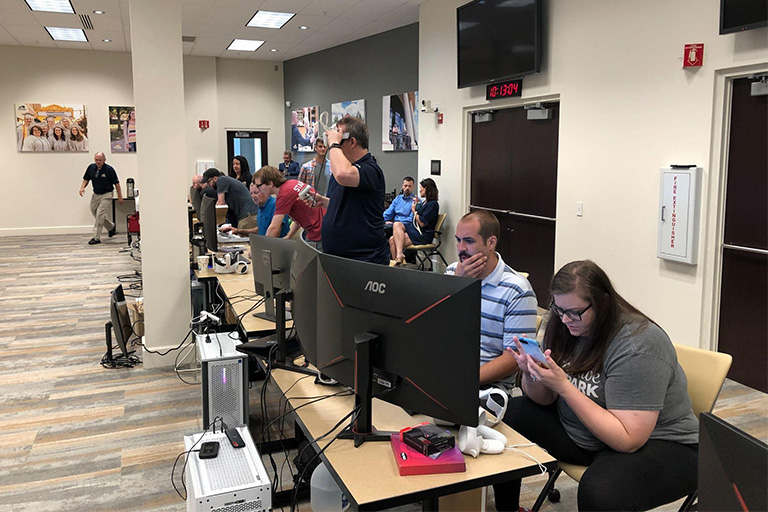
Low-Cost Virtual Reality Platform Transforms Technician Training in Advanced Manufacturing
Published on Feb 2, 2023
 A group of educators and professors have unveiled a revolutionary new training platform
that is set to transform the way technicians in advanced manufacturing are trained.
This project is a collaboration between Somerset Community College (SCC) in Somerset,
Kentucky; Tennessee Tech University, in Cookeville, Tennessee; and Edmonds College
in Lynnwood, Washington.
A group of educators and professors have unveiled a revolutionary new training platform
that is set to transform the way technicians in advanced manufacturing are trained.
This project is a collaboration between Somerset Community College (SCC) in Somerset,
Kentucky; Tennessee Tech University, in Cookeville, Tennessee; and Edmonds College
in Lynnwood, Washington.
Traditionally, technicians and companies that employ them have relied on costly hardware and hands-on training to gain the skills needed to perform their tasks. However, the advent of virtual reality (VR) has opened up new possibilities for training, with the technology able to replicate real-world scenarios and provide immersive, effective learning experiences.
The problem is, VR applications are expensive, making it difficult for community and technical colleges to adopt them as a training tool. This is where the Low-Cost Virtual Reality Platform project comes in.
Led by a team of educators with related experience and expertise, the project has developed a low-cost platform for creating VR modules that can be customized and adopted by colleges with limited resources. This project is supported by the National Science Foundation’s Advanced Technological Education program under Grant No. 2055722. For more information about this program https://somerset.kctcs.edu/vrplatform/.
The platform has already been used to develop four VR modules on blueprint reading, basic work area safety, quality control, and geometric dimensioning and tolerancing, with promising results.
This innovative project is proving that effective training doesn't have to be expensive or out of reach. By providing a solution to a longstanding problem, the project is helping to create a training method that is accessible for students and affordable for schools, colleges, and companies.
"The potential impact of this project cannot be understated. Obviously, we are just getting the VR ball rolling at this point but consider what is possible as groups of teachers from the east coast to the west coast are capable of creating their own VR environments, lecture materials, and teaching aids,” stated Eric Wooldridge, Professor of Advanced Manufacturing at Somerset Community College and Principal Investigator for the Low-Cost Virtual Reality Platform project.
As the demand for skilled technicians in advanced manufacturing continues to grow, this low-cost virtual reality platform is poised to become a game-changer, helping to bridge the skills gap and equip the next generation of technicians with the knowledge and expertise they need to succeed.
The project team is confident that the low-cost virtual reality platform will have a lasting impact on technician training in advanced manufacturing. By providing an immersive and interactive learning experience, the platform is helping to engage students and keep them motivated while also increasing retention and comprehension of complex concepts.
The project is being closely watched by educators and industry leaders alike, as it has the potential to become a model for other technical training programs. It's clear that virtual reality has a bright future in education, and this project is leading the way in demonstrating its potential to transform how technicians are trained.
“Developing VR-based educational materials has become a new way of teaching and learning in all STEM disciplines. I am so glad to be a part of this wonderful team who is developing and implementing a number of advanced technological education modules to help and support the needs of the 21st-century workforce,” said Dr. Ismail Fidan, Professor of Manufacturing and Engineering Technology and College of Engineering-Faculty Fellow in Innovation and Techno-Entrepreneurship at Tennessee Technological University.
The team is excited to continue developing and refining the platform, and to see how it impacts the careers and success of technicians in advanced manufacturing. They are committed to sharing their findings and insights with the broader community, and to helping others adopt and customize the platform for their own training programs.
Overall, this national research project is a testament to the power of collaboration, innovation, and technology to drive positive change in education and training. It's a story that's worth telling and one that will inspire others to think outside the box and find new and effective ways to train the next generation of technicians and professionals.
